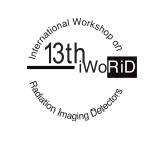Speaker
Mr
Erik Fröjdh
(Mid Sweden University)
Description
High stopping power is one of the most important figures of merit for X-ray detectors. CdTe is a promising material but suffers from: material defects, non-ideal charge transport and long range X-ray
fluorescence. Those factors reduce the image quality and deteriorate spectral information.
In this project we used a monochromatic pencil beam collimated through a 20 um pinhole to measure the depth of interaction dependence of the detector spectral response. The sensor was a 1 mm thick CdTe detector with a pixel pitch of 110 um, bump bonded to a Timepix readout chip operating in Time-Over-Threshold mode. The measurements were carried out at the Extreme Conditions beamline I15 of the Diamond Light Source. The measurement was arranged with the beam entering the sensor at an angle of ~20 degrees to the surface. The beam then passed through ~25 pixels before leaving through
the bottom of the sensor. The photon energy was tuned to 77 keV giving a variation in the beam intensity of about three orders of magnitude along the beam path. Spectra in Time-Over-Threshold
mode were recorded showing each individual interaction along the beam path.
The bias voltage was varied between -30V and -300V to investigate how the electric field affected the spectral information. For this setup it is worth noticing the large impact of fluorescence. At -300V the
photo peak and escape peak are of similar height. For high bias voltages the spectra remains clear throughout the whole depth but for lower voltages as -50V, only the top part of the sensor carries
spectral information. This is an effect of the low hole mobility and the longer range the electrons have
to travel in a low field.
In addition to the depth of interaction measurement we have performed a general synchrotron characterization of the detector with respect to uniformity, energy resolution and charge sharing effects.
Author
Mr
Erik Fröjdh
(Mid Sweden University)
Co-authors
Dr
Börje Norlin
(Mid Sweden University)
Prof.
Christer Fröjdh
(Mid Sweden University)
Dr
Dzmitry Maneuski
(Universiy of Glascow)
Eva N. Gimenez
(Diamond Light Source)
Dr
Graeme Stevart
(University of Glascow)
Dr
Göran Thungström
(Mid Sweden University)
Heribert Wilhelm
(Diamond Light Source)
Julien Marchal
(Diamond Light Source)
Mr
Rasif Modh Zain
(University of Glascow)
Prof.
Val O'Shea
(University of Glascow)

